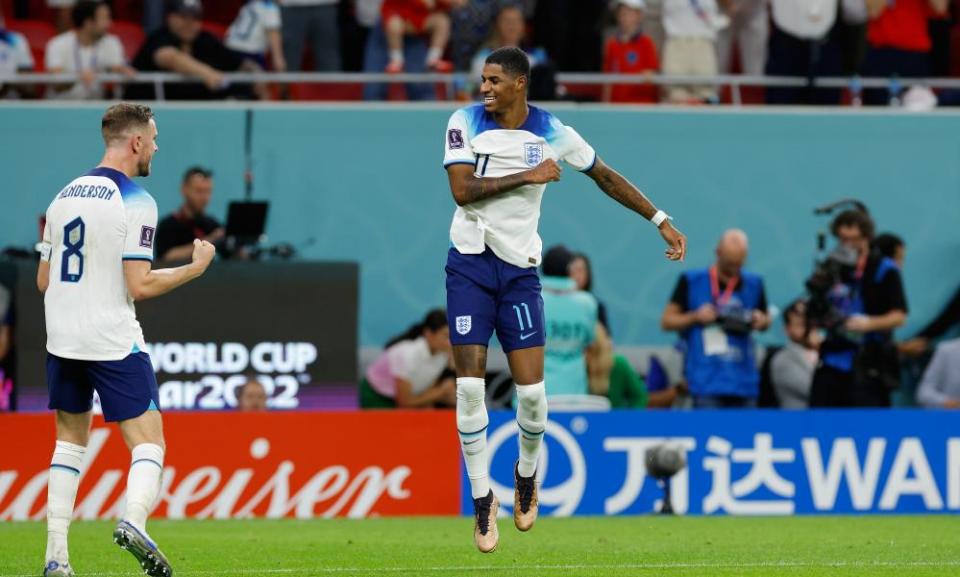Marcus Rashford rediscovers the joy of football after tough times
At half-time on Tuesday night, England had a problem. They were in control of their World Cup Group B fixture against Wales but had not scored. For momentum, for the fans, for keeping critics in the media and online at bay, something needed to change. And so, five minutes after the restart, Marcus Rashford stepped up and smashed a free-kick into the top corner from 25 yards.
The Manchester United forward followed up with the final goal in the 3-0 victory. Taking a long pass on the run, he chopped inside the Welsh left-back Connor Roberts, beat him definitively with a stepover, then drove the ball between the legs of the goalkeeper Danny Ward. It was an exhilarating, exuberant moment and, as he turned towards the crowd and his teammates, Rashford flashed his famous smile. England now face Senegal in the last 16 on Sunday.
Related: Marcus Rashford double puts England top of group and sends Wales home
Rashford is a problem solver, just ask Boris Johnson. But he has had more to work out over the past year than at any time in his meteoric career. In the summer of 2021 and struggling with injury, he put off dealing with a shoulder problem so he could take part in the European Championship. That tournament was a great success for the country, but intensely challenging for Rashford. Used exclusively as a substitute, he failed to make an impact on the field and when he was brought on during the final against Italy for the express purposes of taking a penalty, he missed and England lost.
What followed was a shameful moment for the country. Rashford, and fellow England internationals Bukayo Saka and Jadon Sancho, became the targets of racist abuse. A mural of Rashford in Withington, Greater Manchester, was defaced. Some more coded criticism also came his way: the suggestion that Rashford should concentrate on football and forget social justice and his campaigning for free school meals and childhood literacy.
No one knows the toll that period took on Rashford the person, and it was not the first time he had had to deal with racist abuse, but the worst season of his career as a player then followed. At club level for Manchester United he struggled. Taking time to recover from that shoulder injury he also languished in the shadow of the legend and legendary ego, Cristiano Ronaldo. Six months ago Rashford was dropped from the England squad. At the time, Gareth Southgate described the decision as “straightforward”.

Today, fans need only use the evidence of their eyes to see how much has changed. Rashford has no doubt benefited from a change of coach at Old Trafford, the Dutchman Eric ten Hag having assured the player of his belief in him and his ability. Goals have returned to Rashford’s game, 10 so far in all competitions this season, but, crucially, so has the flair. On top of all his myriad personal qualities, Rashford is an exceptionally gifted footballer and has the ability to do things with the ball, at pace, that few others can, even in the Premier League.
This has been manifest in Qatar, where Rashford has three goals, up there with Kylian Mbappé and Lionel Messi in the battle for the Golden Boot. His first goal in the tournament, against Iran, came just 49 seconds after he had come on as a substitute – he sent a defender to the floor with a clever feint before passing under the keeper.
Related: Marcus Rashford ‘different player’ after return to form, says Gareth Southgate
After the Wales match Southgate spoke frankly about the recovery of a player he has always supported, even when choosing to leave him out of his team. “It’s been a challenge for him,” Southgate said. “I went and saw him in the summer, had a long chat with him, and he had some clear ideas he felt he needed to think about and do.
“You can see with his club there has been happiness in his performances this year, and that has shown itself on the training ground with us. We have a different version completely to the player we had in the Euros last summer. It’s great for him, and because it’s great for him it’s great for us.”
Rashford dedicated his free-kick goal to the memory of his friend, Garfield Hayward, who had died just days before. “He’s had quite a long battle with cancer, so I’m pleased I managed to score for him”, he said. “He’s always been a big supporter of mine. He was just a great person and I’m pleased he came into my life, really.”
The way Rashford articulated publicly news he had kept private from the England squad was another reminder of his ability to confront positively the difficult moments in his life. From growing up in Wythenshawe on free school meals, the child of a single mother with three jobs, to confronting the UK government and, now, rediscovering the joy of playing the game that has transformed his life in ways he might not always have asked for, Rashford has always been faced by problems. But he has also remained dedicated to working out the answers.

 Yahoo Movies
Yahoo Movies 
